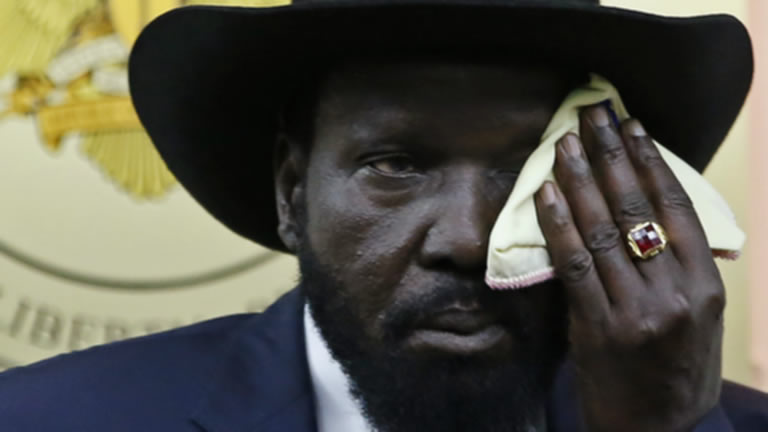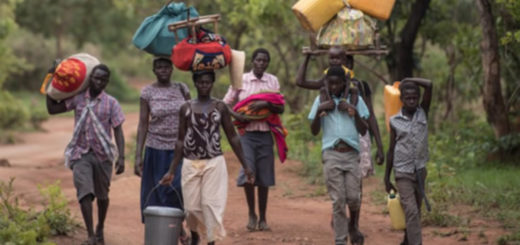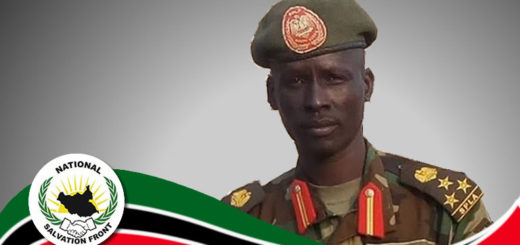Putting dictator Kiir’s Amnesty into perspective

The ideal logic of an amnesty is that it is usually to be granted by a righteous and democratic government with the knowledge and consensus of legislature and judiciary; giving conditional freedom to an outgoing dictatorship and or other militant combatants, to mitigate the costs of political chaos, which is often incensed by brutal and barbaric terrorism in total disregard of human rights, rule of law and constitutional safeguards that ensure a peaceful and prosperous society.
If logic were a standard applicable to the insanity called government in Juba, then commonsense would have it that amnesty by the dictatorship of Kiir only serves the purpose of a political and military mockery of the efforts of legitimate revolutionaries and freedom fighters as well a slap in the face of the rule of law doctrine.
If a dictatorship is so (because it excels at violating all laws of the land and in using pages of citizen rights enshrined in the constitution as nothing less than ‘toilet paper’ and in so doing defaults itself by, in and of law) then it becomes apparent that the intention of such amnesty is two-fold;
- Inviting like-minded unscrupulous brutes and terror-inclined stooges to scapegoat into the feast on the misery, sweat and blood, tears and suffering of citizens, and escape any meaningful prospects of accountability for past, present and future crimes, and
- prolonging the lifeblood of the dictatorship by exploiting fractures within the rank and file of legitimate opposition and assembling the appearance of political and military power, absolutism and forge a reign of terror union to be visited upon the majority citizenry.
Thomas Jefferson, the 3rd United States president is often quoted as having said: “Tyranny is that which is legal for the government and illegal for the citizenry”. This statement has been used in arguments in the impeachment case of the 45th United States President Donald J. Trump, on abuse of power akin to a monarchy, when Trump sought to arrogate to himself absolute power to pardon and give amnesty to his political and military aides, for any crimes committed in the execution of Trump’s selfish political bidding.
Tyranny is that which is legal for the government and illegal for the citizenry
In the case of South Sudan; the military junta led by Salva Kiir have continued to rule by decree, have continued to dilute the provisions of the constitution to attain their overarching selfish group interests and in some instances used amnesty provisions to negotiate the surrender of legitimate opposition.
It is indeed a sad day every time a dictator dishes out an amnesty to the victims of actions, policies and in-actions of that very dictatorship.
It is shameful that society can be easily rendered helpless and at the mercy of deliberate abuse of the true intentions, design and concept of amnesty; a feat by which dictators seek to equate a moral and legal equivalence, in attempts by such dictators to hoodwink public opinion in a different and immoral, illegal direction.
This direction is often away from the truth, away from a fair and legitimate public interest in the use of amnesty for the greater public good and not to satisfy narrow, selfish, political, military and ethnic domination interests of dictatorships.
Just because a dictator like Salva Kiir can exploit amnesty doctrines to extend his reign of terror, does not make it legal nor stand any moral test. While an elected president, in a democracy, who is a servant of the people and must not have individual and or group interests, other than the best interests of all his citizens, and therefore must never be judge, jury and executioner; the case of South Sudan would make our blood capillaries burst in protest.
Kiir is judge, jury, executioner and is also the perpetrator of the crime for which he then mutates to offer conditional amnesty as leverage to underscore blind loyalty…
Kiir is judge, jury, executioner and is also the perpetrator of the crime for which he then mutates to offer conditional amnesty as leverage to underscore blind loyalty which in most cases is characterized by fear for dear life and hence submission of the victims.
“Amnesty deals reduce the incentive for dictators to fight to the bitter – and bloody – end” -writes rule of law commentator Julia Pettengil. It is then self-defeating that a dictator would put themselves in the position of rewarding liberation dissent with amnesty.
The double-edged sword motive of any amnesty dictated by the Kiir regime in Juba is as clear as the failures of his junta to respect the transitional constitution, a multitude of negotiated peaceful political settlements and abhorrence for the rule of law.
An amnesty as an act of erasure provides a legal basis for the decision by government [, and not the president and his circle of yes-men], [and such definition of government is not that which is embodied in dictatorships and tyrannies where the judiciary, executive and legislature are all extensions of the president and his close allies,] not to punish offenders for particular crimes or offenses committed within a fixed period of time or specified situation.
It is important to free ourselves from the normalcy created in a dictatorship, where citizens are no longer able to question government; and in turn citizens out of fear and for a need to survive every day, begin to accept that government has earned by its wrath, a monopoly on what is legal and that all other voices are illegal if the ‘president’ says so.
In that vein, it is relevant that the system to determine the crimes for which amnesty is extended to offenders is clear, fair, transparent and within the law; and these determinations must never be allowed to get contaminated by the long hand of dictatorships.
We must ask ourselves; when has any dictatorship ever extended amnesty to their political and military rivals, for criminal offenses, that could be prosecuted to a logical conclusion in a free and fair judicial system and in accordance with the law of the land?
Most, if not all dictatorships, offer amnesty as a last resort when blatant and unlawful arrest, detention, imprisonment, torture, disappearance of dissenting voices are no longer an immediate attractive option for silencing criticism of its policies, actions, failures, human rights abuses, financial crimes etc.
The regime of Kiir and his henchmen are unfortunately borrowing from dark pages of history. They have chosen to learn from other dictators, and continue to tick all the boxes in their race to a baptism of fire; self-absorbed, compassionless, sadistic, boundless appetite for power -with Kiir showcasing an evolved psychopathic and narcissistic cult-like personality.
It is no surprise that all instruments of the state are designed to serve at the pleasure of Kiir and by default his close associates.
What are the crimes of Kiir’s supposed recent amnesty recipients? What is the history of Kiir’s amnesty deals? What are the new realities for all those who have been falsely accused by the Kiir junta, detained, tortured, denied their rights, prosecuted in a sham justice process, unfairly convicted by a judiciary that has to confirm a sentence with the president; only to later be released without any opportunity to contest their conditional release and amnesty?
National Salva Front (NAS) Chairman Gen Thomas Cirillo Swaka and his comrades who have been forced to band together to defend the dignity of their people, to save their country from total collapse, to restore justice and equality of all citizens before the law; have not committed any crimes in and prior to their pursuit of a just cause.
The costs of liberation and the consequences of self-defence mechanisms as a response to the aggression of government militia can not make a legitimate case for NAS to waste its energies on Kiir’s amnesty efforts.
What would be the purpose of embracing such duplicity and in the process giving Kiir’s amnesty offer moral credibility; yet NAS is in a struggle to ensure that all those citizens who do not have nor should they need, military and political leverage to negotiate their freedom, are set free in a new democratic dispensation that is based on the rule of law and not the ethnic militia might of the ruler.
What do we learn from the short-term triumph of Kiir’s dictatorship, especially how his leadership makes every attempt to flaunt the system and abuse such necessary safeguards as amnesty, for their own political and military expediency?
How does our experience of Kiir’s authoritarian rule inform and shape our practical views of the struggle for the rule of law, for democracy, for the respect of human rights and preservation of human dignity, for the prosperity and security of all citizens in our new republic?
I have never seen a country where one arm of government, the executive, goes all out to discredit another arm, the judiciary. It is really becoming a dictatorship because one man thinks he can manage every decision and ignore every other arm of government
“I have never seen a country where one arm of government, the executive, goes all out to discredit another arm, the judiciary. It is really becoming a dictatorship because one man thinks he can manage every decision and ignore every other arm of government” – Moses Mvenge, a founder member of Zimbabwe’s ruling party ZANU-PF [Zimbabwe African National Union-Patriotic Front] complained three years after their 1997 election victory.
This historical image of Zimbabwe can help us, in South Sudan have a real-time appreciation of the predicament we find ourselves in today. Today, Kiir, unlike Robert Mugabe, controls everything – from the executive, paid opposition in executive and in the national legislative assembly, iron-fisted control of the judiciary, where senior judges only compete for a privilege to preside over oaths of office to boot-licking appointees.
Amnesty to persons with dissenting views, especially those resolute on confronting dictatorships in the arena of political dialogue should be shameful. Yet again, we are reminded that dictators are not in the business of dialogue, especially when such dialogue seeks to pave the way for expiry of their terror.
Can a dictatorship create a system which guarantees that their legacy ensures unquestioned immunity and advance lifelong amnesty for crimes committed against citizens and country? Everything is possible and the absurd is plausible when it comes to the tribal militia-junta of Kiir!
Such amnesty by Kiir unto himself for his own crimes, against his own people and country and in violation of the constitution of a republic whose destruction he shamelessly presides over; would be unsurprising!
##



